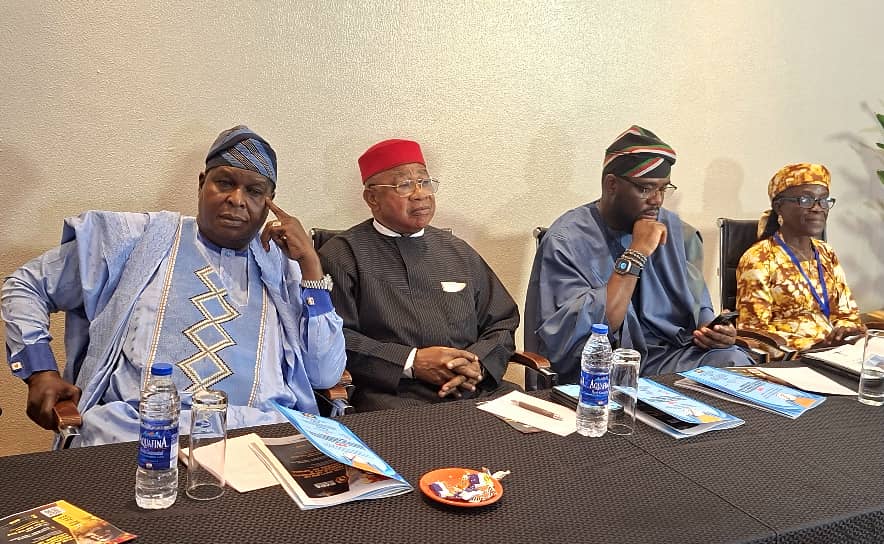By Joan Odafe
Stakeholders in the tourism sector have called for enhanced professionalism, certification and stronger collaboration to drive sustainable growth in the industry.
They made the call during the conference and awards ceremony organised by the Association of Nigerian Journalists and Writers of Tourism (ANJET) on Thursday in Lagos.
The conference was with the theme, ‘The Role of International Hospitality Brands in The Growth of Nigerian Tourism and Economy’.
ANJET president, Mr Okorie Uguru, said the event was aimed at taking stock of Nigeria’s tourism journey while looking into the future, and also to celebrate excellence.
Uguru said the event also offered an opportunity to recognise individuals and organisations that had contributed to the growth of the industry in the past 40 years.
Tracing the influence of journalists to the early 1960s, Uguru noted that travel journalists played an active role in shaping the nation’s tourism narrative.
“More than any other group or association in Nigeria, we are the holders and upholders of institutional memory of the industry. We know who has done what,” he said.
He urged journalists to adapt to modern trends in information sharing, including social media, content creation, and mastering every form of tourism information dissemination.
Uguru commended the awardees, including Olusegun Runsewe, Franklin Ogbuewu, Jemi Alade, Abimbola Bode-Thomas, Olanwale Akinboboye and Ganiyu Balogun, for building visibility and growth the tourism industry was currently enjoying.
Also speaking during the event, Director-General of the National Institute for Hospitality and Tourism (NIHOTOUR), Dr Abisoye Fagade, emphasised the urgent need to close the widening skills gaps in Nigeria’s tourism and hospitality industry.
He noted that many businesses in the sector lacked sustainability because of the absence of skilled hands and structured capacity building.
Fagade, who was also the Chief Host of the event, said this could be achieved through certification and professional training for industry practitioners.
“Over the years, we invest in a lot of structure but realise that business in Nigeria doesn’t stand the test of time because we only invested in brick and mortar.
This key gap set is still wide. We are still looking for good hands, and the kind of job that we do is not aspirational enough.
“Certification ensures that every professional in our industry operates with the same level of excellence expected anywhere in the world, from Dubai to Kigali to Cape Town.
“Without a skilled, certified workforce, no tourism policy, no investment, no hotel brand, no matter how global, can truly succeed in Nigeria,” he said.
Fagade commended ANJET for celebrating legacy and excellence by recognising and honouring practitioners who dedicated their lives to building the industry in the past four decades.
The Director-General of the Nigerian Tourism Development Authority (NTDA), Mr Olayiwola Awakan, reaffirmed the authority’s commitment to strengthening collaboration with stakeholders and reawakening national interest in building a vibrant, sustainable tourism economy.
Awakan, represented by NTDA’s South-West Zonal Coordinator, Mrs Alice Akinsola, said the authority remained focused on inclusiveness, innovation and destination development.
“NTDA is out to do the best — to grow our economy, make our currency stronger, and position tourism as a key driver of sustainable growth,” he said.
Former Director-General of the National Council for Arts and Culture, Olusegun Runsewe, decried the neglect of tourism in Nigeria.
Runsewe, who was one of the awardees, said tourism was the biggest employer of labour, after agriculture, and the neglect being reflected was evident that the stakeholders’ don’t understand the industry.
He urged stakeholders to have a change of attitude to building a big brand such as tourism.
Former Nigerian Ambassador to Greece, Franklin Ogbuewu, said without the aspect of culture, not much could be done in tourism.
Ogbuewu, who was also a former Minister of Tourism and Culture, urged practitioners to ensure they sell culture, as a product, to attract foreign tourists, who looked forward to such experiences.(NAN) (www.nannews.ng)
Edited by Folasade Adeniran











